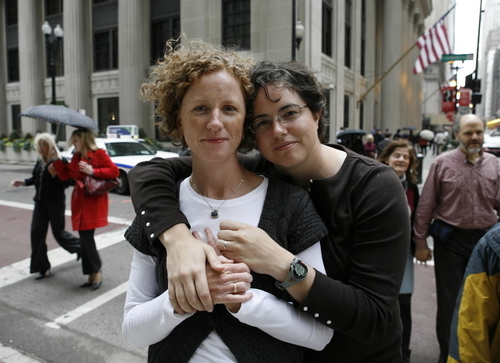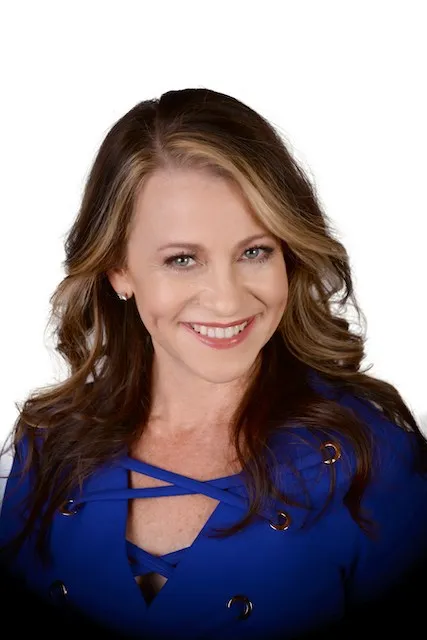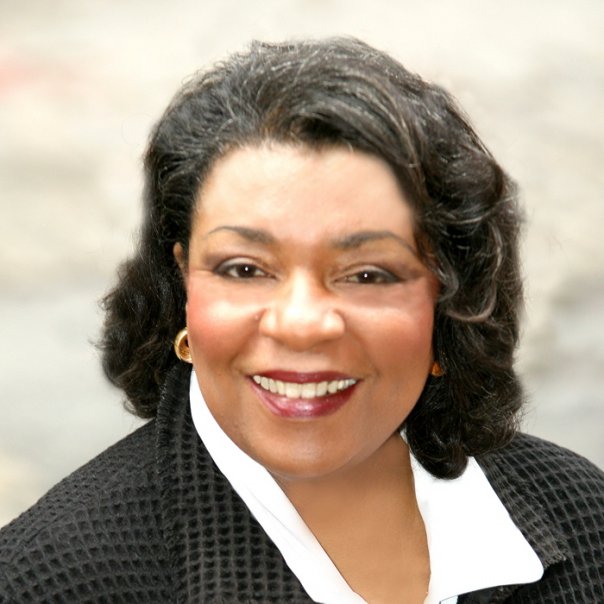 Chicago residents Suzanne Dunne and Amy Bessette, who have participated in Landmark Education’s programs, were recently featured by the Chicago Tribune as a Chicago couple who were recently married in California, and who may be affected by the passage of the state’s controversial Proposition 8, which eliminated marriage rights for gay couples. Here is the Chicago Tribune story.
Chicago residents Suzanne Dunne and Amy Bessette, who have participated in Landmark Education’s programs, were recently featured by the Chicago Tribune as a Chicago couple who were recently married in California, and who may be affected by the passage of the state’s controversial Proposition 8, which eliminated marriage rights for gay couples. Here is the Chicago Tribune story.
Gays Find Victory Falls Short
by Christi Parsons
She gave money to Barack Obama and sent out letters on his behalf, believing that his election would move things forward for gays and lesbians around the country.
But Suzanne Dunne’s joy over his election is tempered by sorrow, as the country’s presidential choice came paired with the passage of several state measures to limit gay rights.
One of them may even jeopardize the status of her marriage, just weeks after she and her wife flew to California to get a license and marry on the beach. The same night California voters backed Obama, its citizens also voted to ban gay marriage.
As others celebrate the social progress they think Obama represents, many of his lesbian and gay supporters nurse a private sense of loss.
“It’s crushing,” says Dunne, who lives with her spouse in Chicago’s Uptown neighborhood. “It’s just a really personal feeling of being discriminated against, a personal affront to who I am.”
Social and religious conservatives are finding cause to celebrate this week, despite the defeat of Republican John McCain and the failure of ballot measures in three states to restrict abortion.
They scored a sweeping win of measures to ban same-sex marriage in California, Florida and Arizona. And in a significant victory for the religious movement behind it, a measure meant to stop gays and lesbians from adopting children passed in Arkansas.
“What it really proves is that traditional values are still alive in spite of what people would like to think,” said Rev. Robert Vanden Bosch, an Illinois activist and executive director of Concerned Christian Americans. “The traditional values are stronger even in California, even than what people anticipated.”
But rainbow flags are flying at half-staff around the country. Thirty states have now passed bans on same-sex marriage, raising serious questions about the country’s support for the rights of gays and lesbians—something that Obama has advocated repeatedly on the campaign trail and in some of his most famous speeches.
Surprising to many gay activists is how other minority communities treated their cause. In California, exit polls showed 70 percent of African-American voters were for the ban on gay marriage, as were more than half of Hispanic voters.
Many gay leaders thought having Obama at the top of the ballot would doom the California proposition, which Obama spoke out against. They assumed the voters who turned out in droves to elect Obama would side with him on that.
But Obama supports civil unions and not gay marriage, a message that conservative activists disseminated widely in the weeks before the election.
“Some of our activists worked on a faulty premise, that if black voters came out for Obama, then the measures wouldn’t pass,” said Rick Garcia, director of public policy for Equality Illinois, a statewide gay civil rights organization. “Just because one supports Barack Obama does not necessarily translate.”
That’s the part that Dunne finds so disheartening.
“Imagine if there was a measure on the ballot not to allow African-Americans some right that everyone else enjoyed,” Dunne said. “People wouldn’t stand for that. … It still feels like a blind spot in the equal rights game. People don’t seem to realize it’s all the same thing.
“An African-American being elected is all part of equal rights that also applies to the gay community,” she said.
Dunne married Amy Bessette in early October, hoping their act would help put a human face on the concept of gay marriage.
They paid $50 and got their license at a clerk’s office. A few days later, they stood before their family and friends and pledged their lives to each other.
It felt like an important moment in history, she said. A lesbian couple could request a marriage license and get it. And the country was considering a black candidate for president, one who speaks in favor of equality regardless of sexual orientation.
“We worship an awesome God in the blue states, and we don’t like federal agents poking around our libraries in the red states,” Obama said in his 2004 Democratic National Convention speech. “We coach Little League in the blue states and, yes, we’ve got some gay friends in the red states.”
The speech introduced him to the nation, and to a diverse community of gay, lesbian, bisexual and transgendered people unaccustomed to favorable mention in national political speeches.
That’s why Obama’s election meant so much to Wayne Williams and his partner, Robert Wilshe, of Aurora.
When Obama announced his bid for the presidency, they gave him money. They’ve been driving around for months with an Obama magnet on their car.
“It’s bittersweet,” Williams said of this week’s events. “We’re so pleased to have such a wonderful president-elect. But that’s counterbalanced by having four states pass some very counterproductive—for us, anyways—ballot measures that really are a step backwards.”
Williams and Wilshe also flew to California this summer to be married. They think of California as a second home, and as a progressive state where gay rights would flourish and lead the nation.
They, like Dunne, worry that the ballot measure may result in nullification of their marriage certificate. But their bigger concern is that the measure’s passage makes their relationship a second-class one.
Williams, who works for a software company, says he doesn’t blame Obama for not supporting gay marriage.
“Obama’s audience was the whole nation,” he says. “The gay and lesbian population is realistic in knowing we’re not going to get everything at once.”
He still has hope that an Obama era in politics will bring about greater acceptance.
“The hope was to get someone at the helm who could get the whole U.S. population to come together,” he said. “The last eight years have been such a divisive period, not just outside the United States but also within it. And it’s not just about race, but also social class and social status.
“President Obama,” he said, “is going to take us a long way to deal with that.”


